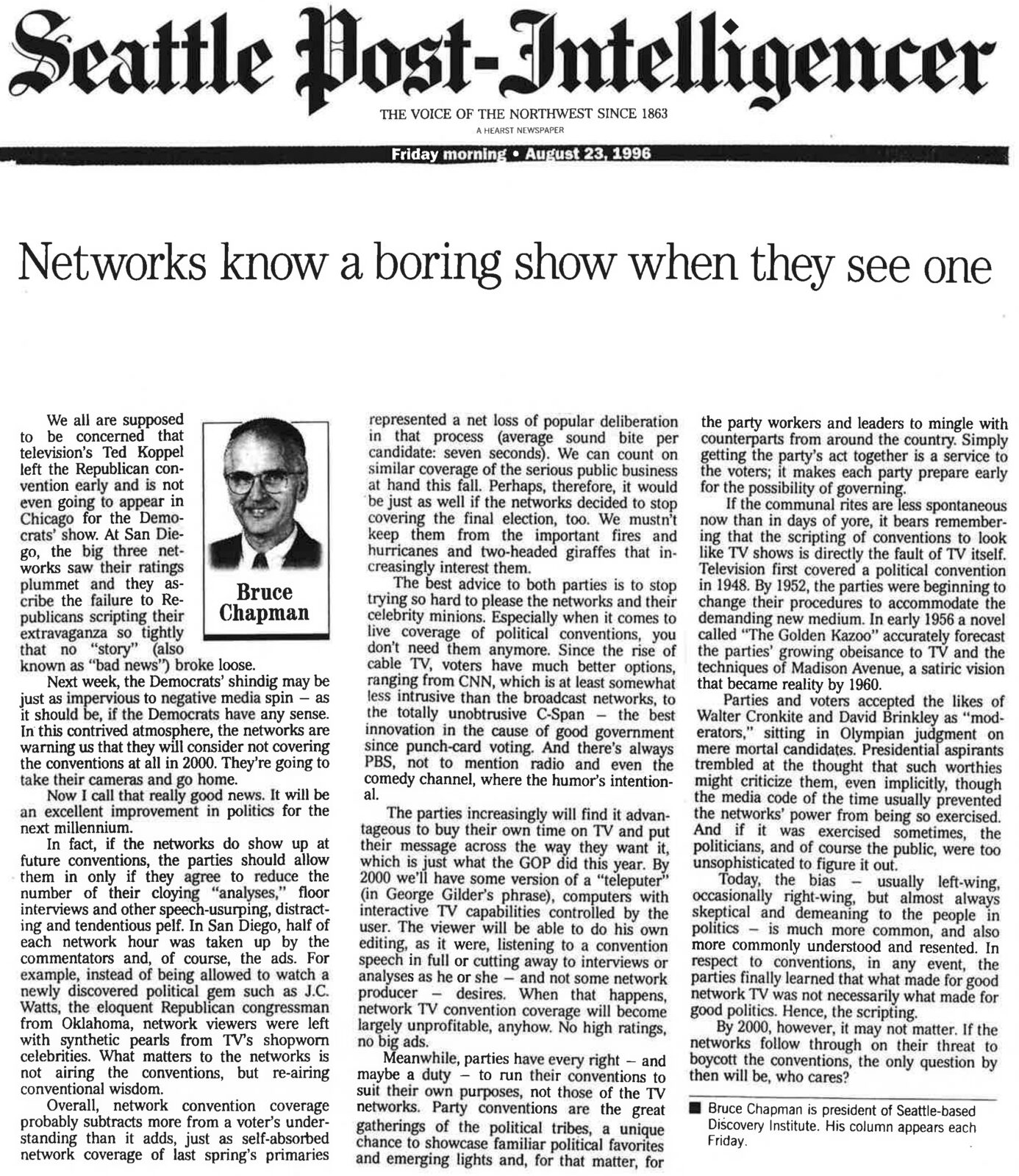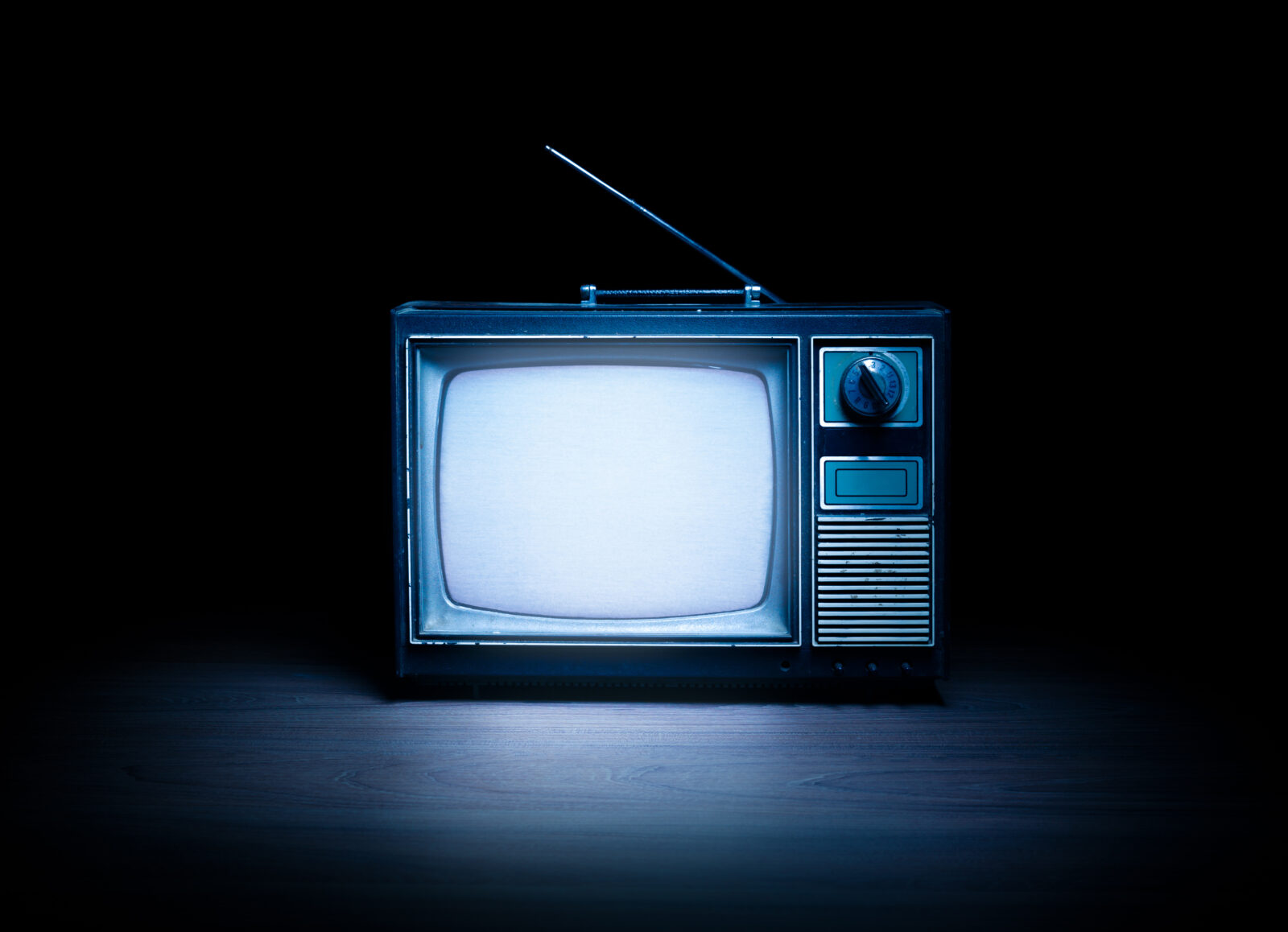Networks know a boring show when they see one
Originally published at Seattle Post-IntelligencerWe are all supposed to be concerned that television’s Ted Koppel left the Republican convention early and is not even going to appear in Chicago for the Democrats’ show. At San Diego, the big three networks saw their ratings plummet and they ascribe this failure to Republicans scripting their extravaganza so tightly that no “story” (also known as “bad news”) broke loose.
Next week, the Democrats’ shindig may be just as impervious to negative media spin–as it should be, if the Democrats have any sense. In this contrived atmosphere, the networks are warning us that they will consider not covering the conventions at all in the year 2000. They’re going to take their cameras and go home.
Now I call that really good news! It will be an excellent improvement in politics for the next millennium.
In fact, if the networks do show up at future conventions, the parties should allow them in only if they agree to reduce the number of their cloying “analyses,” floor interviews and other speech-usurping, distracting and tendentious pelf. In San Diego, half of each network hour was taken up by the commentators and, of course, the ads. For example, instead of being allowed to watch a newly discovered political gem like J.C. Watts, the eloquent black Republican Congressman from Oklahoma, network viewers were left with synthetic pearls from TV’s shopworn celebrities. What matters to the networks is not airing the conventions, but re-airing conventional wisdom.
Overall, network convention coverage probably subtracts more from a voter’s understanding than it adds, just as self-absorbed network coverage of last spring’s primaries represented a net loss of popular deliberation in that process (average sound bite per candidate: 7 seconds!). We can count on similar coverage of the serious public business at hand this fall. Perhaps, therefore, it would be just as well if the networks decided to stop covering the final election, too. We mustn’t keep them from the important fires and hurricanes and two-headed giraffes that increasingly interest them.
The best advice to both parties is to stop trying so hard to please the networks and their celebrity minions. Especially when it comes to live coverage of political conventions, you don’t need them anymore. Since the rise of cable TV, voters have much better options, ranging from CNN, which is at least somewhat less intrusive than the broadcast networks, to the totally unobtrusive C-Span–the best innovation in the cause of good government since punch-card voting. And there’s always PBS, not to mention radio and even the comedy channel, where the humor’s intentional.
The parties increasingly will find it advantageous to buy their own time on TV and put their message across the way they want it, which is just what the GOP did this year. By 2000 we’ll have some version of a “teleputer” (in George Gilder’s phrase), computers with interactive TV capabilities controlled by the user. The viewer will be able to do his own editing, as it were, listening to a convention speech in full or cutting away to interviews or analyses as he or she–and not some network producer–desires. When that happens, network TV convention coverage will become largely unprofitable, anyhow. No high ratings, no big ads.
Meanwhile, parties have every right–and maybe a duty– to run their conventions to suit their own purposes, not those of the TV networks. Party conventions are the great gatherings of the political tribes, a unique chance to showcase familiar political favorites and emerging lights, and, for that matter, for the party workers and leaders to mingle with counterparts from around the country. Simply getting the party’s act together is a service to the voters; it makes each party prepare early for the possibility of governing.
If these communal rites are less spontaneous now than in days of yore, it bears remembering that the scripting of conventions to look like TV shows is directly the fault of TV itself. Television first covered a political convention in 1948. By 1952, the parties were beginning to change their procedures to accommodate the demanding new medium. In early 1956 a novel called The Golden Kazoo accurately forecast the parties’ growing obeisance to TV and the techniques of “Madison Avenue,” a satiric vision that became reality by 1960.
Parties and voters accepted the likes of Walter Cronkite and David Brinkley as “moderators,” sitting in Olympian judgment on mere mortal candidates. Presidential aspirants trembled at the thought that such worthies might criticize them, even implicitly, though the media code of the time usually prevented the networks’ power from being so exercised. And if it was exercised sometimes, the politicians, and of course the public, were too unsophisticated to figure it out.
Today, the bias–usually left wing, occasionally right wing, but almost always skeptical and demeaning to the people in politics–is much more common, and also more commonly understood and resented. In respect to conventions, in any event, the parties finally learned that what made for good network TV was not necessarily what made for good politics. Hence, the scripting.
By 2000, however, it may not matter. If the networks follow through on their threat to boycott the conventions, the only question by then will be, who cares?

